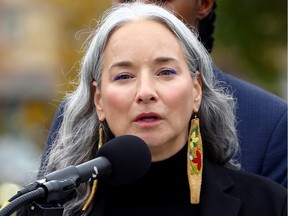Politics
Manitoba Minister Faces Backlash After Controversial Post

The political landscape in Manitoba has been shaken following Families Minister Nahanni Fontaine’s controversial Instagram post regarding the assassination of political commentator Charlie Kirk. Fontaine expressed a lack of empathy for Kirk, a 31-year-old husband and father, igniting a fierce debate about the standards of conduct expected from public officials.
On a recent episode of “Inside Politics,” host Kevin Klein was joined by political analysts Royce Koop, a Professor of Political Studies at the University of Manitoba, and legal expert Lawrence Pinsky, K.C.. Together, they dissected the implications of Fontaine’s actions and the responsibility of Premier Wab Kinew in addressing the fallout.
The discussion centered on the troubling nature of Fontaine’s social media activity. After sharing a post that many interpreted as dehumanizing, she later deleted it and issued an apology. The panel underscored that a cabinet minister’s role demands a level of empathy and restraint that Fontaine’s comments failed to demonstrate. “A minister isn’t a keyboard warrior; a minister holds a leadership role that demands restraint and empathy,” Koop emphasized.
Pinsky further criticized Fontaine’s actions, labeling them as “arrogant, cruel, and incompatible with the portfolio she leads.” He highlighted the importance of accountability, noting that amplifying violent rhetoric equates to endorsement. The consensus among the analysts was clear: Fontaine’s conduct raises serious questions about her fitness for office.
Former Prime Minister Stephen Harper recently echoed this sentiment, warning against the erosion of democratic discourse into violence and ostracization. His remarks serve as a stark reminder of the potential dangers of trivializing political opposition. The panel discussed how such rhetoric can transform public perception, framing political opponents as enemies rather than fellow citizens.
In addition to analyzing Fontaine’s actions, the episode also scrutinized media coverage of the incident. Critics argue that labeling Kirk as merely “polarizing” while ignoring the gravity of his assassination reflects a troubling trend towards moral evasion. Klein’s team called for a more responsible approach to reporting that prioritizes human life over sensationalism.
The episode concluded with a pressing question directed at Premier Kinew: What will his response be? His initial statement condemned the murder, yet maintaining Fontaine in her position could signal to Manitobans that there are no consequences for such behavior. Conversely, removing her from cabinet could reinforce a commitment to upholding democratic values and rejecting dehumanization in political discourse.
The stakes are high for Kinew as he navigates this controversy. The decision he makes will likely impact not only his credibility but also the broader health of Manitoba’s political climate. Advocates for accountability urge the public to engage with this issue, emphasizing the need for a government that aspires to a higher standard than the divisive and often hostile rhetoric permeating social media.
To explore the full analysis and the implications of these events, viewers are encouraged to watch the latest episode of “Inside Politics.” The discussion provides a comprehensive look at the current political climate in Manitoba and the vital importance of ethical leadership.
-

 Politics1 month ago
Politics1 month agoSecwepemc First Nation Seeks Aboriginal Title Over Kamloops Area
-

 World5 months ago
World5 months agoScientists Unearth Ancient Antarctic Ice to Unlock Climate Secrets
-

 Entertainment5 months ago
Entertainment5 months agoTrump and McCormick to Announce $70 Billion Energy Investments
-

 Lifestyle5 months ago
Lifestyle5 months agoTransLink Launches Food Truck Program to Boost Revenue in Vancouver
-

 Science5 months ago
Science5 months agoFour Astronauts Return to Earth After International Space Station Mission
-

 Lifestyle3 months ago
Lifestyle3 months agoManitoba’s Burger Champion Shines Again Amid Dining Innovations
-

 Technology4 months ago
Technology4 months agoApple Notes Enhances Functionality with Markdown Support in macOS 26
-

 Top Stories2 months ago
Top Stories2 months agoUrgent Update: Fatal Crash on Highway 99 Claims Life of Pitt Meadows Man
-

 Top Stories3 weeks ago
Top Stories3 weeks agoHomemade Houseboat ‘Neverlanding’ Captivates Lake Huron Voyagers
-

 Politics4 months ago
Politics4 months agoUkrainian Tennis Star Elina Svitolina Faces Death Threats Online
-

 Sports5 months ago
Sports5 months agoSearch Underway for Missing Hunter Amid Hokkaido Bear Emergency
-

 Politics5 months ago
Politics5 months agoCarney Engages First Nations Leaders at Development Law Summit





















